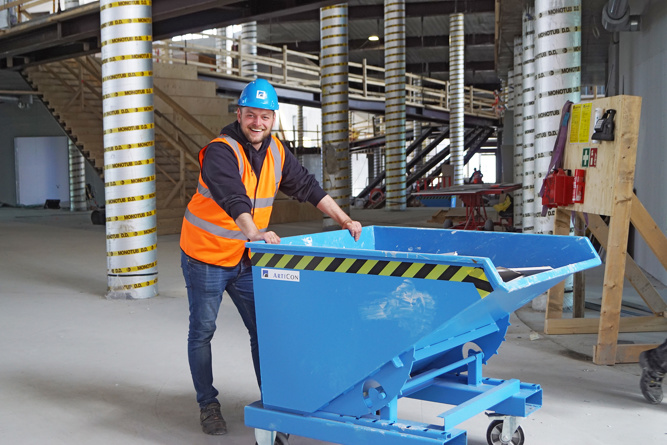Environmental measures:
Sorting and reusing waste
In recent months Articon and the waste management company IRF have been preparing a project, which aims to increase sorting and recycling of waste in the construction industry. The project has been launched.
Record volumes of waste
Things are going well in the Faroe Islands at the moment. The population is growing and the economy is booming. The dark side of this rosy picture is, however, that the volumes of waste produced are breaking all records. In the last two years the volumes of waste for incineration have grown by nearly 24%, while the annual increase you would usually expect to see is 2.5%.
Initiative to increase sorting of waste in the construction industry
IRF and Articon are working together on a joint initiative to encourage sorting, reuse and recycling of waste in the construction industry.
Articon has been working to highlight the issue of waste, reuse and recycling amongst its staff. The company aims to sort more waste more efficiently in order to maximise reuse and reduce any unnecessary consumption of materials.
Guidelines for sorting construction industry waste
In the wake of more Faroese construction firms requesting more guidance regarding sorting of waste, IRF has developed a poster with the different categories of construction waste.
The guidance is a poster, which is primarily made up of images. The full text on the poster is in Faroese, English, Polish and Rumanian, so that all construction industry workers can understand it. The main purpose of the poster is to offer a quick and simple overview of the categories of construction waste and how to sort them.
Waste reception facility under construction
In autumn 2018, IRF started constructing a waste reception facility annexed to the Hagaleiti Incineration Plant, and this hall is expected to be ready for use in September 2019.
The waste reception facility will provide the industry with much improved conditions for sorting waste. It will become both quicker and easier to get rid off and sort waste for recycling.
It is hoped that the hall will increase the volume of industry waste that is reused and recycled and thereby reduce the volumes destined for incineration or landfills.
Several advantages to sorting more waste
Though it is a relatively new project, it is already clear to ArtiCon that there are several advantages to sorting more waste. In addition to benefitting the environment and cutting consumption of natural resources, there are many other good reasons to sort waste. Site procedures have become clearer, for example, and sites are, as a rule, tidier. In addition, increased sorting constitutes a major financial saving for the company. Firstly, it is cheaper to send waste to recycling rather than incineration or landfills. Secondly, offcuts and other residual material are reused to a greater extent, because they are arranged in a more organise manner at the sites. Articon is also trying to reduce any unnecessary use of materials for temporary solutions at the workplace, e.g. fencing, temporary staircases, shuttering. All these are made from quality materials, which can easily be used several times on site.
More posters in the pipeline
At present IRF’s new poster is being trialled at ArtiCon’s sites, which are now organised with more equipment for sorting waste. The plan is to distribute the poster to all construction firms in IRF’s area when the reception hall is ready for use in autumn.
Work is now also underway to develop a similar poster for harbours, the fishing and aquaculture industries in the Faroe Islands. If everything goes according to plan, this poster will be ready later this year.
Waste is a joint responsibility
We must all take responsibility for the large volumes of waste in the Faroe Islands, and together we should all
find a solution. The solution lies in cooperation between those who produce, package and transport goods, those who use the goods and those who handle the waste. Goods should be produced in manner that makes them easier to reuse and recycle, goods should be appropriately disposed of and waste processing companies should provide information about and facilities to receive a growing number of waste categories for recycling.
